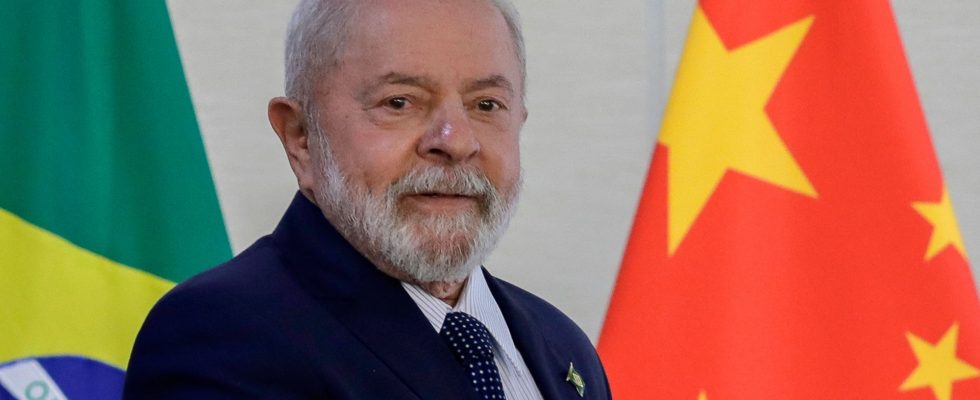Status: 04/12/2023 03:40 a.m
Brazil’s President travels to China with a large delegation. He wants to deepen relations with the already most important trading partner. And sees himself as a bridge builder – also with a view to the war in Ukraine.
Seven ministers and five governors are flying along, as well as the powerful Senate President and more than 200 entrepreneurs and managers, mainly from the agricultural sector. It is an impressive delegation that will accompany Brazil’s President Lula da Silva to China.
That alone shows the importance of this five-day state visit. After trips to neighboring Argentina and the United States, it is the third since Lula took office in January. Lula wants to normalize Brazil’s relations with strategic partners after his predecessor Jair Bolsonaro diplomatically sidelined the country. China is Brazil’s most important trading partner.
But the large delegation shows that Brasilia wants to take cooperation with China to a new level, says political scientist Oliver Stuenkel from the renowned Getulio Vargas Foundation. The trip has great geopolitical relevance. “In times of increasing tensions between the West and China, Lula is sending a clear message.”
Non-Aligned Vision
Washington and Brussels are watching China’s growing influence in the region with concern. The fact that Lula wants to meet with representatives of the tech giant Huawei in Shanghai shows that he does not want to be guided by these concerns. Lula sees himself as a neutral mediator in a multipolar world and thus follows the foreign policy lines that shaped his first terms of office.
“With his trip, Lula is signaling that he is sticking to his vision of non-alignment – and forging ties with everyone,” says Stuenkel. It is always important for Brazil to have alternatives and thus a better negotiating position. One example is the current talks with the EU about a free trade agreement.
Brazil is also part of the BRICS group of countries, which includes China, Russia, India and South Africa. Brazil’s ex-president and close confidant of Lula, Dilma Rousseff, has just taken over the chair of the BRICS Group’s New Development Bank (NDB), based in Beijing. States are considering building new types of financial structures to reduce dependency on the overpowering US dollar.
diversification of relationships
In Beijing and Shanghai, Lula is now campaigning for more investment in train routes, satellites or new factories. According to Brasilia, more than 20 cooperation agreements could be signed.
A Ford plant in the state of Bahia is to be taken over by a Chinese carmaker who wants to build electric vehicles there. There is also talk of expanding joint satellite monitoring in the Amazon region. However, this trip is likely to be primarily about cooperation with the agricultural sector.
South America’s largest economy has increasingly maneuvered itself into an asymmetry, critics complain. “Brazil has become hostage to his agenda,” says Ana Garcia. Unlike the export-oriented agricultural sector, Brazil’s industry cannot compete with China or other Asian countries.
Approach to the agricultural sector
A gradual deindustrialization has been taking place for several years. “Reversing this development, as Lula has promised, is a big challenge,” says Garcia. It is probably not in China’s interest at the moment, nor in the interest of Brazil’s agricultural sector, which has meanwhile also become a political heavyweight.
Lula, who has been in office for exactly 100 days when he starts his trip to China, needs the agricultural sector to stabilize the economy and quickly implement his election promises: more jobs, more money for social affairs and health. He lacks the political power in Congress to go it alone.
That’s why the trip also represents an opportunity for that, believes Stuenkel. “The majority of the agribusiness sector has supported President Bolsonaro. Now being able to take many agribusiness leaders with him also serves as an opportunity for him to come together and show that his policies are bringing positive results to this increasingly influential group.”
“Brazil must not overestimate its influence”
In the run-up to the trip, Lula had again proposed a “peace club,” the formation of a group of countries that could mediate in the war against Ukraine — with China’s participation. But now is not the right time for that, believes Marcos Azambuja, a longtime diplomat from the South American country.
Brazil could offer itself, but should not overestimate its influence. Russia is currently showing no interest in negotiations. Brasilia is also not perceived as impartial by Ukraine, says Stuenkel. Last week, Ukraine strictly rejected a Brazilian proposal to renounce the Crimean Peninsula, which had been annexed by Russia.
“First of all, it is of course a positive thing that countries want to promote dialogue. But there is a risk, perhaps unintentionally, that the Brazilian initiative will ultimately legitimize a Chinese narrative that the West allegedly does not want to negotiate a peace agreement,” said Stuenkel.
Whether and to what extent Lula will address the topic during his trip to China will probably only become clear on Friday when he meets President Xi Jinping.
Brazil’s President Lula da Silva begins China trip
Anne Herrberg, ARD Rio de Janeiro, April 11, 2023 at 12:42 a.m

